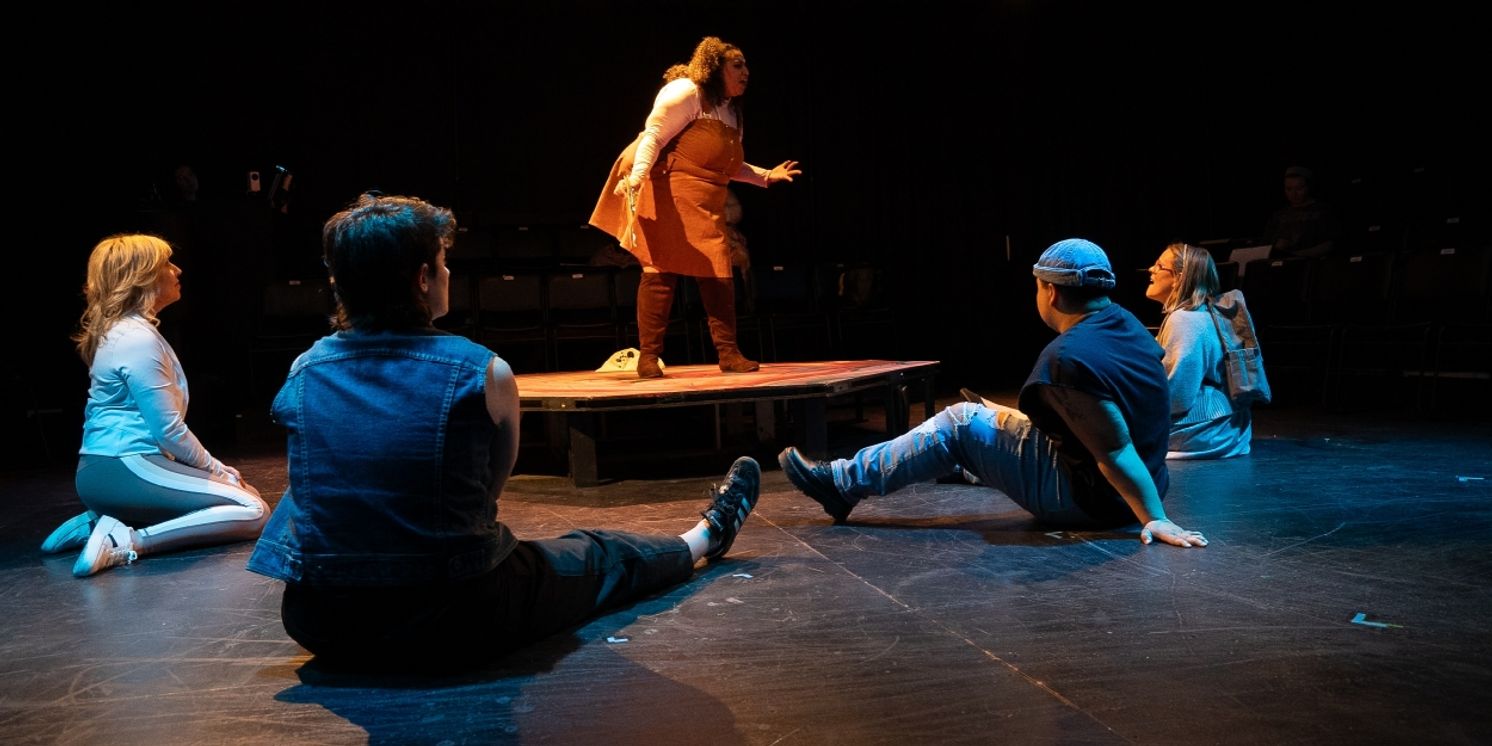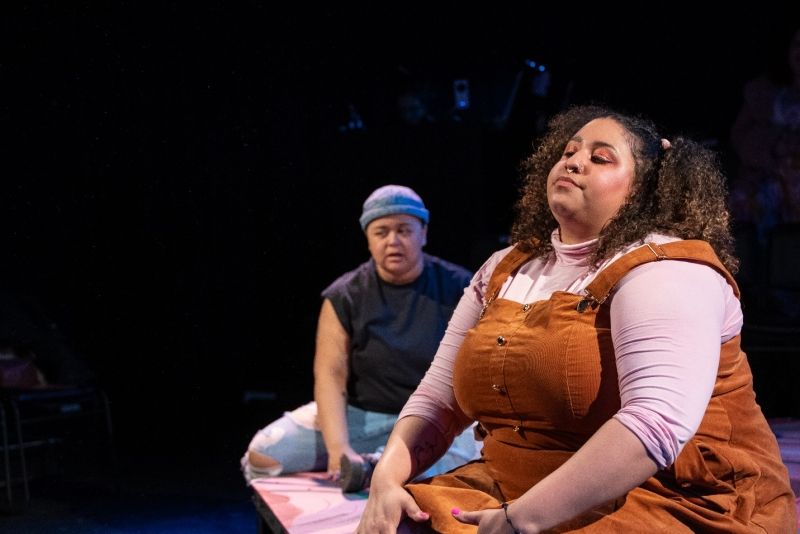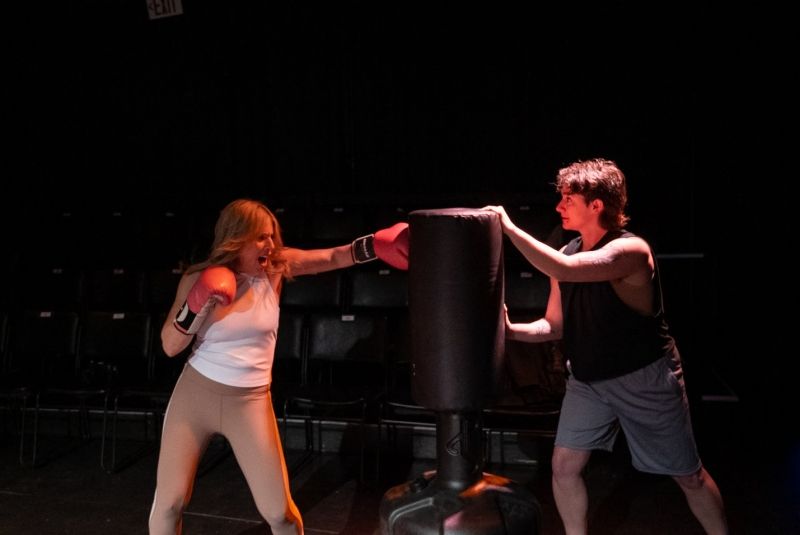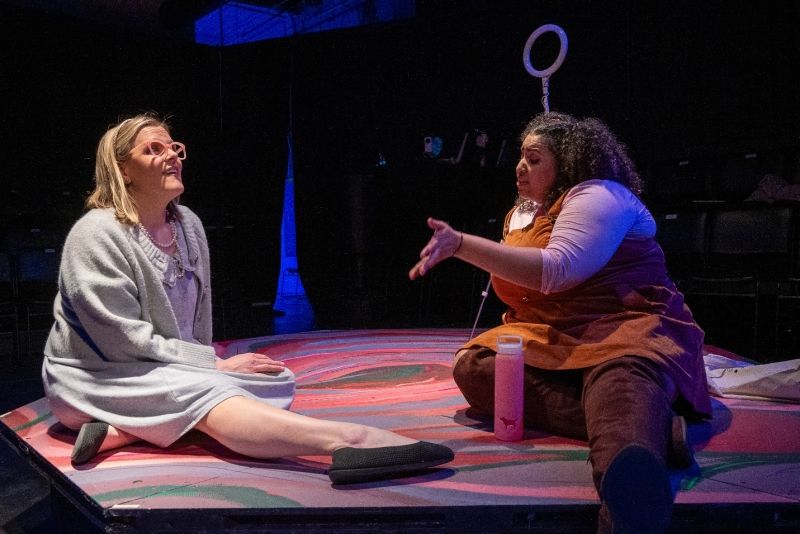Review: COLLECTIVE RAGE: A PLAY IN 5 BETTIES at Burbage Theatre Co.
A Daring Exploration of Female Rage and Desire at Burbage Theatre Co.

Five Betties walk into a theater; what do they do with the place? Far from being in jest, the question goes at the heart of Collective Rage, the Burbage’s most recent production of a play by Jen Silverman directed by Allison Crews in a follow-up to her well-received staging of Witch last year.
With Collective Rage, the Burbage once again succeeds at thoroughly entertaining during the show yet leaving one thinking long and hard after the curtain drops. Comedic yet tender, the play is propelled by a production that never shies away from the script’s demanding pacing and risqué humor. By placing queer characters in a relatively traditional romantic structure, however, that same script causes tensions it cannot fully resolve, leaving the audience to uneasily ponder some of its author’s choices. Still, exhilarating performances and a daring commitment to hope finally carry the day in this modern comedy of manners.
The “collective” of the title is that of five women all named Betty, perhaps to highlight the fundamental similarity of their plight. The Betties differ a lot at first sight, most obviously in terms of social class and sexual orientation, but all are watching their lives pass them by. Two of them are trapped in sexless, stifling traditional marriages, one languishes in an unstimulating retail job, and the last two have cut themselves off from their feelings, especially their romantic feelings. And here enters their rage, the festering of their pent-up creative, sexual, entrepreneurial, and emotional energies.
By two minor miracles, our Betties come together to stage a devised play, a collective and improvisational creation spearheaded by Betty 3 (the irrepressible Daria-Lyric Montaquila). Betty 3 found inspiration in a production of A Midsummer Night’s Dream, a play she attended on a date with a well-off married woman. And here comes both her challenge and opportunity.
 On the one hand, Betty 3 finds an inspiration she refuses to acknowledge from the play-within-a-play Pyramus and Thisbe which, in Midsummer, is staged and acted by an amateur company Shakespeare and his noble protagonists relentlessly mock. Stealing from the quintessential cultural authority figure, and bluntly going against his audience’s elitism, Betty 3 could be reclaiming the popular roots of the theater. On the other hand, she cannot help but be dazzled by the prestige of the traditional “thea-Tah,” as she puts it, and to attempt a reproduction of its power structures—with herself at the top, as director and star. Audre Lorde famously stated that “the master’s tools will never dismantle the master’s house,” and yet here is Betty 3, attempting to renovate the master’s house using his tools. Can the other four Betties help her see her error, and find their own liberation in the process?
On the one hand, Betty 3 finds an inspiration she refuses to acknowledge from the play-within-a-play Pyramus and Thisbe which, in Midsummer, is staged and acted by an amateur company Shakespeare and his noble protagonists relentlessly mock. Stealing from the quintessential cultural authority figure, and bluntly going against his audience’s elitism, Betty 3 could be reclaiming the popular roots of the theater. On the other hand, she cannot help but be dazzled by the prestige of the traditional “thea-Tah,” as she puts it, and to attempt a reproduction of its power structures—with herself at the top, as director and star. Audre Lorde famously stated that “the master’s tools will never dismantle the master’s house,” and yet here is Betty 3, attempting to renovate the master’s house using his tools. Can the other four Betties help her see her error, and find their own liberation in the process?
The audience should judge for themselves, of course, but the formidable actresses that carry the play make a strong case for the affirmative. Melissa Penick is pitch-perfect as Betty 1, an uptight Upper East Side wife about to explode under the pressure of the paranoid news she inhales in lieu of breakfast. She has perhaps the most satisfying arc of the play, and Penick will make you believe in her awakening and rejoice with her. Much of her growth comes from the relationship she forms with Betty 5, played by Anna Basile, whose switch from emotional restraint to exuberance is clinched in a resonant monologue about the ways she walled herself off from her emotions. As Betty 1’s friend and fellow frustrated housewife Betty 2, Amie Lytle must work with a much quirkier revelation, but she inhabits both the dark and comedic extremes of her oddball character with winning conviction.

Betties 3 and 4, starting from more self-actualized positions, demand less range from their characters, but their actresses convince nonetheless. I hinted above at the charm and energy that Daria-Lyric Montaquila puts in the service of her Betty 3, the force of nature that propels both the play-within-a-play and the play-you-are-watching to their ultimate fates; her charisma fully justifies the starry-eyed tenderness with which Nina Giselle, as Betty 4, pines for her.
Playful, energetic staging will make you want to believe as well, despite some discordant notes coming from the script. One is the play’s insistence on female genitalia which leaves the distinct impression that womanhood resides in one’s underwear, an embarrassing implication in an era when transwomen direly need their cis-sisters’ solidarity. I am also not sure that the play’s Shakespearean reliance on romantic love as a solution to the Betties’ collective rage avoids Betty 3’s mistake of picking the master’s tools to attack his house. Most unsettling, perhaps, is a strangely out-of-place scene where Betty 2 voices a depth of despair that goes to suicidal ideation; that thread is never picked-up again, leaving the finale, for all the triumphant energy Lytle infuses in it, perilously perched on the knife edge between comedy and tragedy.

The play delights most when it avoids these traps of tradition, when it boldly makes unexpected theater with vibrant characters who lean fearlessly into their hearts’ desire for community and freedom. The Betties invite you to join them on this thrilling existential joyride at Burbage Theater Company until April 21st.
Tickets are available online at https://www.burbagetheatre.org/ or call the box office at 401-484-0355.
All photos by Paul Medeiros.
Reader Reviews
Videos

